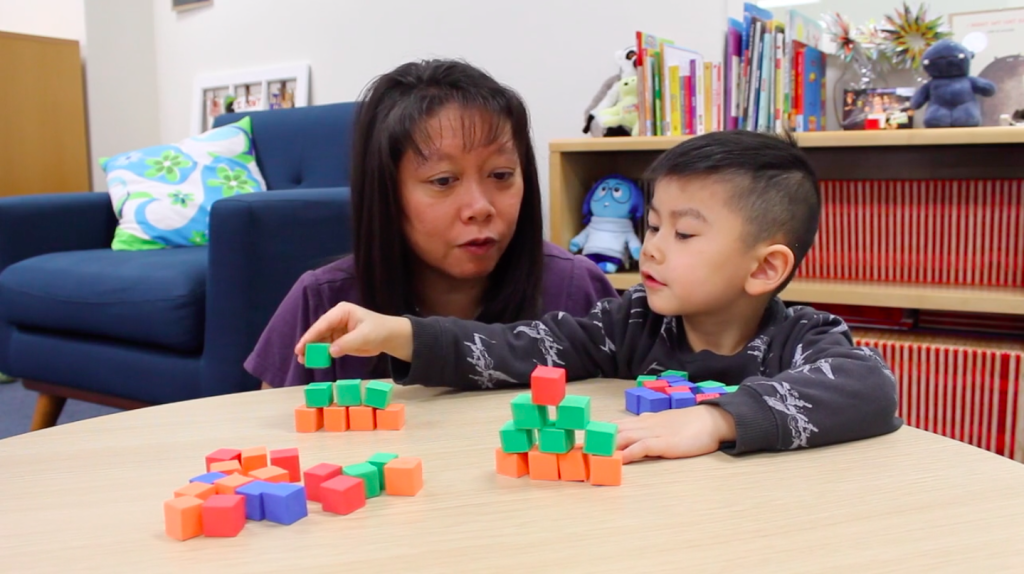- Children develop attitudes toward math through their interactions with parents and caregivers.
- Positive math attitudes support children’s interest in math learning.
- There are simple strategies that families can use to promote positive math attitudes.
Exploring math together as a family supports children’s early math development. But the learning goes beyond just the math content. The messages that parents and caregivers send to their children while engaging in math also shape the way that children think about math. These messages can help children form positive attitudes toward math, which can help them learn from their mistakes, reflect on their thinking, and stay motivated when a problem is challenging.
Encourage Positive Attitudes
Everyone can support children’s early math development. There are simple things that parents can do to help their children develop positive math attitudes. These practices help children see that math is a fun and powerful way to understand the world. When families enjoy math learning, children’s confidence in their ability to learn math grows.
To inspire and support families to engage in math learning together, the nonprofit Tandem, Partners in Early Learning collaborated with DREME to produce a collection of video resources that promote family math. The videos are short, free, and feature real families. Designed for families and professionals who work closely with families, the videos are suitable for home, community workshops, family playgroups, and parent-practitioner meetings.
The Encouraging Positive Math Attitudes video offers ideas for how families can create positive, enjoyable ways to explore math. Below we highlight the positive practices shown in the video.

Embrace Mistakes
Parents can help children understand that there is more to math than getting the right answer. Math learning is a process, and mistakes are a natural and important part of that process. The mistakes that children make when exploring math provide opportunities to learn. They can also give parents insight into children’s thinking. [1]
Children practice their math skills by thinking about what steps led to their mistake. When children make a mistake, rather than solving the problem for them, try to pause and ask questions about their thinking. If children start to lose interest or get frustrated, take a break and return to the activity later.
Ask Questions
By asking questions, parents can encourage their children to think about math problems in different ways, which helps to develop their critical thinking skills. [2] The goal is to have children talk about why they are approaching problems in a particular way. This kind of reflection not only helps children learn, but also helps parents see what math concepts their children understand and where they need more practice.
Parents can use this information to modify their questions and activities. For example:
- How did you figure that out?
- What are you doing?
- How did you know?
- What are some other ways we can try?
Praise Effort
As families explore math together, parents can encourage children by praising their effort (You worked hard!) rather than their skill (You’re so smart!). This keeps the focus on their thinking, which motivates children to keep working on challenging problems. [3]
An effective way to praise effort is to notice specific things children are doing during the math activity. For example:
- Good job counting!
- I saw you point to each object. That was a great way to keep track!
- I like how you kept trying to solve the problem!
- Great work. You had a good idea about how to share the toys fairly!
Stay Positive
Above all, try to keep math exploration positive and encouraging. When children see their parents and caregivers with positive math attitudes, it encourages them to learn and stay motivated.
If a child is excited about a math activity, they may work on it even without encouragement. If a child gets frustrated or does not understand something, show them what they did right. Encourage them to try again using a different strategy or a new approach. It is also OK—and sometimes important—to take a break.
By focusing on children’s thinking, parents can help them build positive attitudes toward math. This will increase children’s interest in math and support their math learning.
Put These Tips into Practice
As we share this video on Encouraging Positive Math Attitudes, we wish to thank the families for their starring roles; Tandem, Partners in Early Learning, for filming and interviewing the families; and The Evelyn and Walter Haas, Jr. Fund for generously funding the development of these videos.
Explore the collection of videos, including ideas for bringing math learning into everyday family life.
[1] Chan, W. W. L., Au, T. K., Lau, N. T. T., & Tang, J. (2017). Counting errors as a window onto children’s place-value concept. Contemporary Educational Psychology, 51, 123–130.
[2] Rittle-Johnson, B., Loehr, A.M. & Durkin, K. (2017). Promoting self-explanation to improve mathematics learning: A meta-analysis and instructional design principles. ZDM Mathematics Education 49, 599–61.
[3] Dweck, C. S. (1986). Motivational processes affecting learning. American Psychologist, 41(10), 1040-1048.



